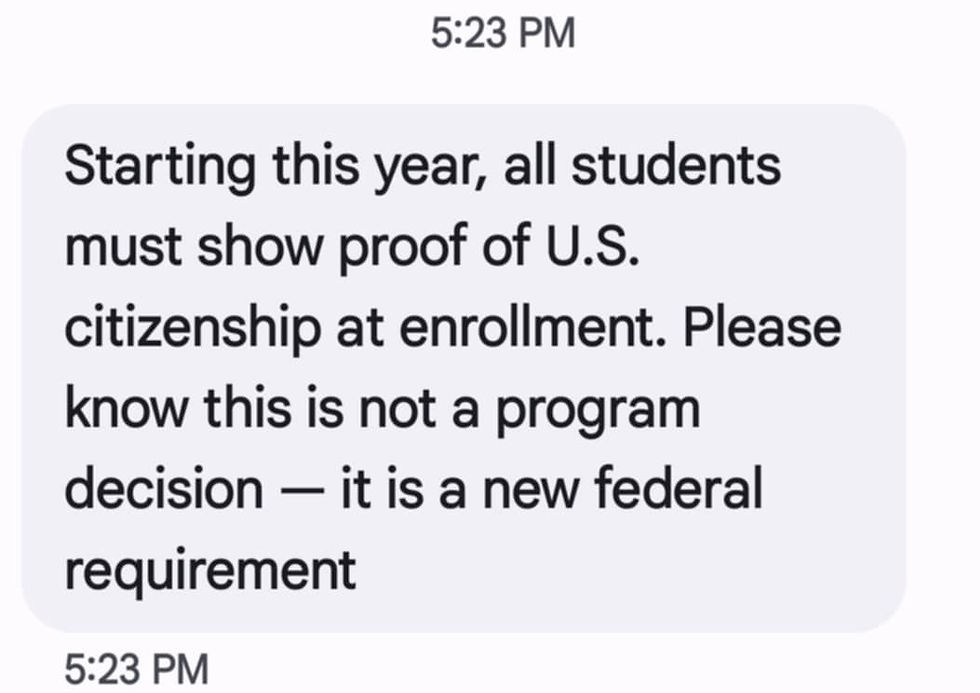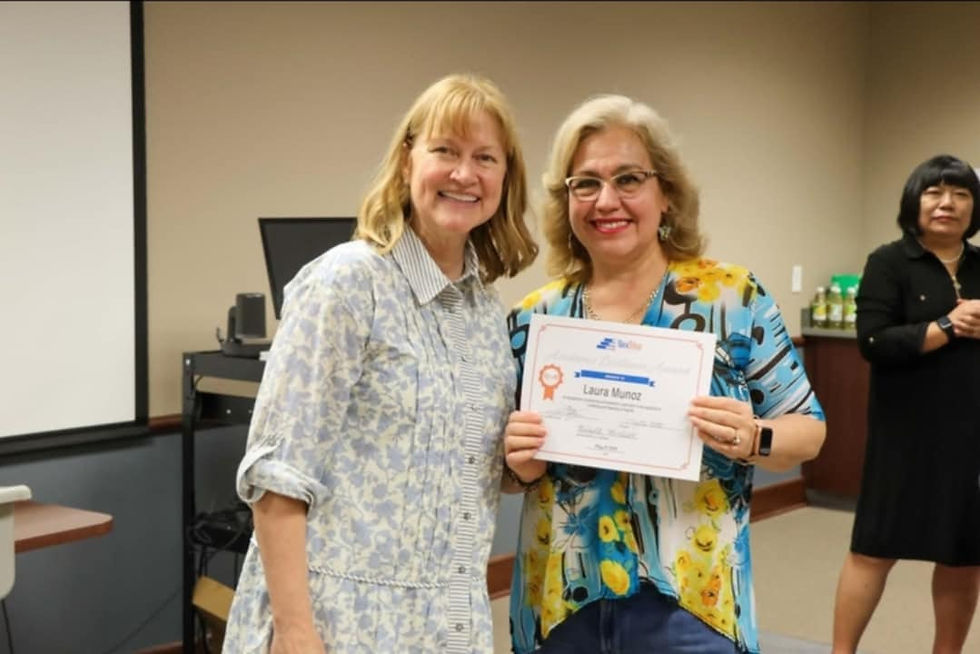“It Affects All of Us”, New Restrictions on English Classes Raise Alarm in the Community
- Planeta Venus

- 28 jul 2025
- 5 Min. de lectura
Wichita Kansas | July 28, 2025
By Claudia Amaro | Planeta Venus

“I went to sign up for English classes through the Goodwill program and was shocked because they’re now asking for a work permit or a valid U.S. ID. They’re no longer accepting undocumented people, and that’s emotionally very difficult,” read a message received by Planeta Venus on Monday, July 21. The message, sent by Alma Leal, reflects growing anxiety and fear among immigrant communities in response to the anti-immigrant rhetoric of the current federal administration—regardless of people’s immigration status.

Alma wasn’t the only one who reached out. Our newsroom also received messages from people confused by texts they had received on their phones. One of them was Laura Muñoz, who received the following message the previous Friday: “Starting this year, all students must show proof of U.S. citizenship at enrollment. Please know this is not a program decision it is a new federal requirement.”
Muñoz initially thought the message came from the Wichita school district and shared it with her family, who were concerned about how the new measure would affect many people they know—friends of their children and extended family. Similar messages began circulating on social media, and some people soon identified the texts as coming from NexStep Alliance.
Based in Wichita, Kansas, NexStep Alliance has long served as a gateway for people seeking to continue their education and improve their quality of life. It offers free or low-cost classes for GED preparation, English as a Second Language (ESL), and the A-OK program, which includes free college courses.
Muñoz, a longtime student of NexStep Alliance, arrived in the U.S. in 2001 without speaking any English. She learned the basics on the job and a year later enrolled in an English class, though she only attended for a few weeks.

According to sources like Migration Policy Institute (MPI) and National Skills Coalition, immigrants in the U.S. face numerous barriers to learning English, including lack of access to affordable ESL classes, long waitlists, limited space, work and family responsibilities, transportation challenges, the digital divide, fear of discrimination or deportation, and low literacy in their native language.
Muñoz believes another barrier is a lack of self-confidence. She said some people already understand a little English, but fear keeps them from practicing it—something she experienced personally. Still, she has not given up and continues attending ESL classes.
On July 21, Muñoz returned to NexStep to register for a new course. “The atmosphere felt completely different,” she told us. “As soon as I walked in, the first thing they did was ask for my ID. It had to be one with the star—the one they call a Real ID.”Muñoz is a U.S. citizen and submitted her ID, but said staff asked for it twice and made a copy. “Some of my classmates—my friends—told me that several of our former classmates couldn’t register this time because they didn’t have the proper ID. And that’s really sad.”
She left with a heavy heart, remembering when she herself lacked legal documentation. “It took me back. I imagined what it would’ve been like if it had happened to me back then. It made me very sad—I put myself in their shoes. People I’ve never met, but I know they’re going through this. And yes, it’s very sad to know they’re being cut off from the opportunity to grow, to move forward. It’s really awful.”
After receiving multiple messages from the community, Planeta Venus contacted Erin Younkin, communications director for Goodwill Industries of Kansas. She was unavailable for an interview but sent a written statement:
“Goodwill and NexStep Alliance are monitoring the recently released interpretation on the applicability of PRWORA to Perkins V and Adult Education federally funded programs. We are committed to full compliance and are evaluating impacts to ensure alignment with our partners at WSU Tech. During this transition period, we remain dedicated to cultivating a positive and respectful educational culture for everyone.
Along with our partners at WSU Tech, we are encouraging our students to gather the documents required under the new federal guidelines. Our team is committed to providing individual support to students who will be navigating this complex process. We are striving to ensure all students receive the assistance they need to continue their education." Below is a list of documents that are accepted with this new federal guideline:
|
This new requirement aligns with the directive announced last Thursday by the U.S. Department of Education under President Donald Trump. According to the department’s official site, access to federal student aid will now be restricted for undocumented immigrants enrolled in technical, vocational, and adult education programs. The policy reverses a 1997 guidance letter issued during the Clinton administration that had allowed certain exceptions.
According to the new rule published in the Federal Register, programs funded under the Perkins V Act and Title II of the Workforce Innovation and Opportunity Act (WIOA) are now classified as “federal public benefits” and must be limited to U.S. citizens and certain legal immigrants in accordance with the 1996 PRWORA law. While enforcement will not begin until after Aug. 9, 2025, federally funded programs are expected to begin verifying participants’ immigration status now.
“Federally funded education programs should benefit U.S. citizens—not illegal aliens,” said Secretary of Education Linda McMahon in the department’s statement.
PRWORA or the Personal Responsibility and Work Opportunity Reconciliation Act, is a federal law signed by President Bill Clinton in 1996 that reformed the welfare system. It replaced the Aid to Families with Dependent Children (AFDC) program with Temporary Assistance for Needy Families (TANF), gave states more flexibility in administering aid, set lifetime limits for benefits, and restricted eligibility for certain federal programs—including food stamps and TANF—for both legal and undocumented immigrants.
Planeta Venus also contacted María Kury, Spanish-language communications specialist with the Wichita school district, who said that so far, there have been no changes in enrollment requirements. “We ask for an ID and birth certificate for the student being enrolled, but that’s only to confirm their name and date of birth,” she explained. She added that they recently held a Spanish-language enrollment event that was well-attended by Latino families.
At the Wichita Indochinese Center, another organization offering adult education programs, staff told us they have not yet received official instructions regarding the new policies but expect to learn more after Aug. 14. They anticipate the guidelines will likely align with those already adopted by other adult education providers.
Muñoz shared that even though she is now a U.S. citizen, policies like these still affect her emotionally. She concluded with a message that echoes across the community: “People think things like this won’t affect them. But in the end, they do. They affect all of us.”
Comentarios